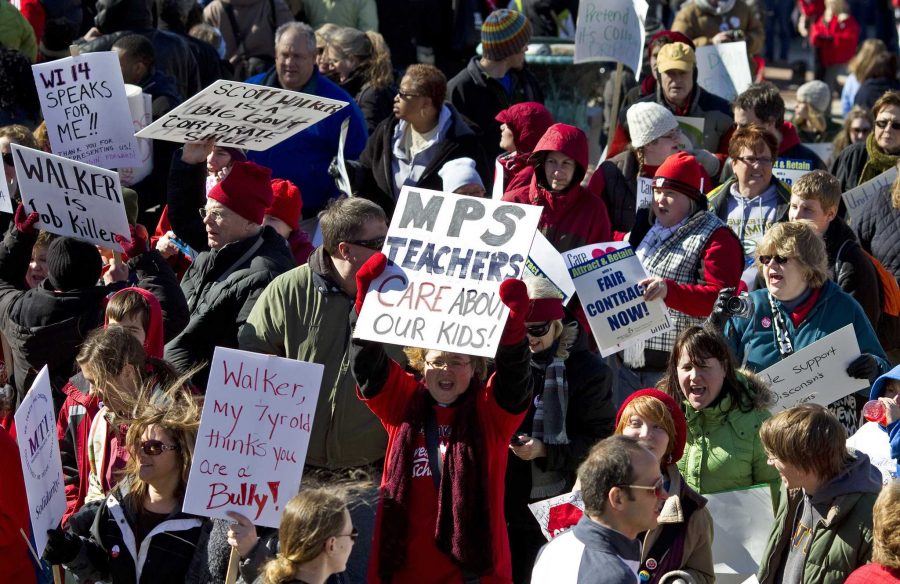Wisconsin has become a battleground in a fight for workers’ rights this year, as Republican Governor Scott Walker proposed curtailing the power of government unions while cutting government spending and taxes. His proposal has sparked controversy as government workers argue that the legislation is an assault on unions and dismantles their right. But Walker’s reasonable proposal saves Wisconsin taxpayers money.
Unions originally grew out of distrust for greedy factory managers who exploited their workers and made them work in unsafe conditions for meager pay. Today, the country no longer has a factory-based economy, and blue-collar jobs on the floor of a factory are not a common occupation. Working conditions have been significantly improved, thanks to a vast array of government regulations designed to protect workers’ rights. Unions have declined since the 1970s, because jobs have shifted from the factory floor to offices instead, where better regulations and better working conditions largely eliminate the need for unions.
Private sector unions are restrained by nature. When a union demands too much from an employer, the employer will be forced out of business if it can not pay for the union’s demands while staying competitive. Employees can strike if they feel that they have been dealt with unfairly, but it is a costly option. Employers are free to reject labor demands they find to be too difficult to accept, but running a business without experienced employees is itself difficult. As a result, there is an inherent system of balance in the private sector bargaining process.
Governor Walker does not propose eliminating private sector unions. Rather, his proposal eliminates public sector collective bargaining that has become heavily corrupted by political influence and requires increasingly unsustainable benefits and wages for government workers. Government worker collective bargaining is inherently unfair to the taxpayers, who pay the final cost of workers’ wages and benefits. When the public sector can not meet union demands, government can not just close down like in the private sector. Instead, government raises taxes, giving public sector unions virtually unchecked power to demand wages that will bankrupt governments. Furthermore, the politicians who are negotiating the contracts with public sector unions, supposedly on behalf of the taxpayers are given vast political contributions from unions that help elect their favorite pro-public-sector-union candidates. Essentially, government unions themselves can choose who negotiates with them. In 1975, Victor Gotbaum, a leader in the New York City chapter of the American Federation of State, County, and Municipal Employees, boasted, “We have the ability, in a sense, to elect our own boss.” The negotiating process is thus skewed in favor of unions – and against taxpayers – from the start.
Union supporters often label big business interests as “bullies” who are taking away workers rights with their political influence. But the real “bullies” may not be the businesses at all – they are the unions, who have consistently spent far more than businesses in elections, and using their political influence to waste taxpayer dollars on unreasonable wages and benefits.
Walker’s legislation does not propose eliminating public sector unions altogether. It still maintains collective bargaining for wages, but strips away union bargaining on benefits like health care and pensions. State employees in Wisconsin will now be forced to pay about 5.8% toward their pension, which brings it in line with the national average for private sector workers. Previously, government workers paid nothing into the pension system. Workers would double their payments for health care to 12%, which is only half of the national average that private sector workers pay. Workers in Wisconsin have for too long received benefits that are unaffordable for taxpayers, and the new requirements for employees to pay more for the benefits they get is fair to all parties, especially the taxpayers who ultimately pay for all of the costs of government workers. Allowing workers to pay less into the system was unsustainable going forward, especially when they are paying less than their private sector counterparts have to pay for those benefits.
For wages, government workers would be limited to raises that do not exceed inflation, unless approved by a voter referendum. Thus, Wisconsin public sector workers will no longer be getting outrageous raises when many in the private sector get none. By limiting the raises to inflation, government workers will still get fair salaries and will still have the option of going to the voters if they want higher raises. Walker’s legislation thus gives more power to the people who will be paying for those raises, in allowing the taxpayers to vote on whether they want government workers to receive more money. Government employees do not work for greedy factory owners exploiting them for personal profit. They work for the taxpayers and deserve to have their wages decided by the taxpayers.
The nationwide move towards limiting public sector unions, sparked by Walker, will ultimately save taxpayers money and allow governments at all levels to provide government services to taxpayers at as low a cost as possible. Other states are already considering implementing forms of Walker’s legislation in their own states to curb government unions and cut costs. Even in Massachusetts, Republican State Representative Dan Winslow has proposed legislation would maintain collective bargaining rights for state workers but would give more power to state managers to fire employees and limit state employee wages.








